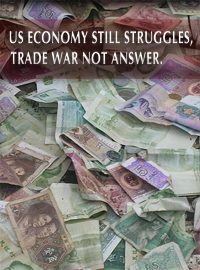
|
The anecdote to America’s economic ills won’t come from engaging in trade wars. It will come from reducing the debt and making Chinese credit irrelevant.
|
|
| The world is an upside-down place when Mitt Romney is supporting a policy championed by Paul Krugman. Yet that’s precisely what’s happening as a bill that seeks to deter China from manipulating the value of its currency winds its way through Capitol Hill. The legislation, which passed the Senate on Tuesday, may still fail to secure passage in the House. But if it becomes law, it will have a serious negative effect on the struggling American economy.
At issue is the fact that China has consistently undervalued its currency, the yuan, to make Chinese goods cheaper overseas – including in the United States – than they would be if the currency was allowed to “float,” meaning that its value would be set by international markets. The result is a spate of cheap Chinese imports, which critics accuse of undermining domestic prosperity by hindering the ability of American goods to compete with their Chinese counterparts on price.
The bill that aims to counteract this trend would exhort China to raise the value of the yuan, and would threaten the nation with tariffs if it refuses. Given the growing fears of Chinese economic dominance and the anemic state of American markets, it comes prepackaged with a significant amount of bipartisan support (it garnered 63 votes in the Senate). But as a matter of relatively basic economics, it’s near-illiterate.
That’s why it’s so discouraging to hear prominent Republicans – supposedly members of a party that gives some thought to how markets work – publicly proclaim themselves bullish on the legislation. Governor Romney has proposed a policy that looks much the same as the one currently under consideration by congress, pledging that he will label China a “currency manipulator” on his first day in office and impose tariffs if the nation doesn’t quickly atone for its monetary sins. South Carolina Senator Lindsay Graham, in typically inelegant fashion, defends the bill on the grounds that “their cheating costs us jobs.”
Far more astute is the diagnosis by Graham’s South Carolina compatriot Jim DeMint – a welcome voice of sanity from within the GOP caucus – who has pronounced, “Starting a trade war with China right now is a huge mistake since they’re our banker. This is just us pounding our chest over here when we’re basically a paper tiger.”
While it’s true that China intentionally undervalues the yuan to goose imports, it’s essential to note that all monetary policy in a global economy cuts both ways. Thus, while Chinese exports can sell for artificially low rates abroad, the weakness of the currency means that imports to the nation are also considerably more expensive. As a result, Chinese citizens either have to pay a premium for imported goods or buy domestic substitutes that are more expensive than what they could access with a market-driven monetary policy. In other words, there’s little, if any, net gain to the Chinese economy from the policy. The same holds true on the American side of the equation: The artificial penalty on American goods in the Chinese market is offset by the huge subsidies that accompany Chinese goods here in the United States, reducing costs across the board for American companies and families. So while it may be unfair that currency depreciation is distorting markets, it’s not especially economically significant.
None of this, of course, justifies the devaluation of the yuan. Even though the policy’s net effect on the United States is quite small, China and the world would still be better off if the currency were allowed to appreciate to its natural rate, eliminating the distortions described above and promoting greater economic efficiency. Unfortunately, the proposed remedy would impose costs significantly higher than the supposed problem.
Because China’s monetary policy falls decidedly within its realm of sovereignty, all the United States can do to effectuate change is to seek a policy change through diplomacy or coercion. The former option stands little chance of success, as the Chinese government is almost always immune to pleas to put diplomatic niceties ahead of what it perceives to be its national self-interest. The latter tact, however, is a double-edged sword, and one that’s likely sharper on our end.
“Tariffs” are simply a euphemism for taxes. Last year, the U.S. imported nearly $365 billion worth of goods from China. If Congress had imposed a tariff of just two percent on that amount, it would have increased costs to the American economy by $7.3 billion. And such action would almost certainly inspire reciprocal tariffs, only driving the costs higher.
If there’s any currency manipulation that Americans should be worried about, it’s happening on our own shores thanks to the Federal Reserve’s “quantitative easing” policies. The antidote to America’s economic ills won’t come from engaging in trade wars. It will come from reducing the debt and making Chinese credit irrelevant; strengthening incentives for entrepreneurs and job creators, and expanding exactly the kind of international trade that this proposal will derail. The Senate has done its worse. Now it’s up to the House to kill another really bad idea. |

























